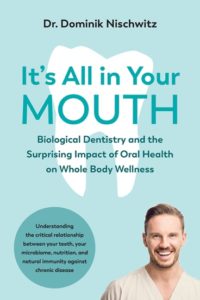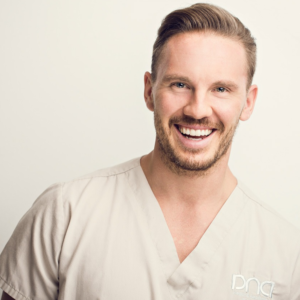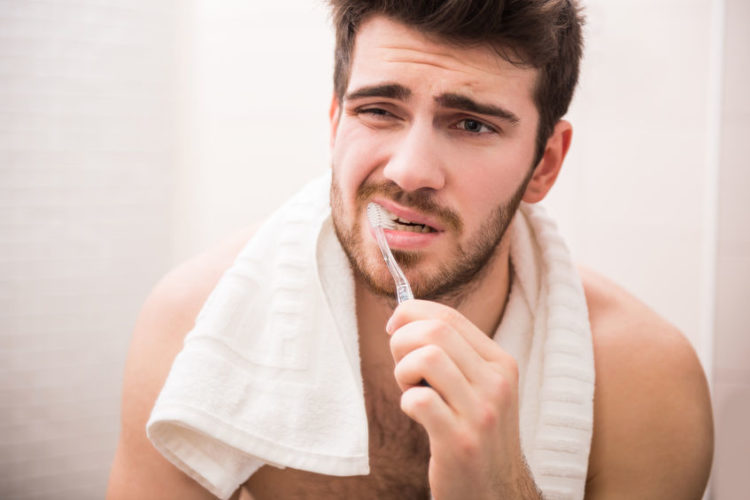Dr. Dominik Nischwitz is the expert on biological dentistry. In layman’s terms, this means examining how issues that start in the mouth can be tied to far-reaching chronic conditions such as obesity, inflammation, stroke, diabetes, Alzheimer’s, heart disease, and even some. The co-founder of the DNA Heath and Aesthetics Center for Biological Dentistry and author of It’s All in Your Mouth: Biological Dentistry and the Surprising Impact of Oral Health on Whole Body Wellness, Nischwitz recently spoke with WellWell about the symbiotic relationship between oral hygiene and the rest of the human body—as well as the future of dentistry.
What’s at the core of biological dentistry, what underappreciated issues does it reflect?
Generally speaking, it’s the understanding that your oral health is fundamentally connected to your overall health and wellbeing. There are countless examples of this. An oral infection can spread to other parts of the body. A misaligned bite may contribute to insomnia, headaches, earaches, poor posture and joint pain. Bacteria of the mouth can aid in the narrowing of blood vessels, which can lead to heart disease. It’s all connected and reactive.
Does this connection work both ways, can biological issues outside of the mouth impact oral health?
Absolutely. For example, research is pretty clear that cavities are correlated with a lack of Vitamin B3, basically lack of sunlight. So depending on where you live or your lifestyle, you may not be able to get enough sun or may not take D supplements and therefore are at higher risk of getting a cavity even with proper dental hygiene.
Can dentists then detect diseases not necessarily connected with oral hygiene early on through dental exam?
For sure, that’s a huge part of biological dentistry. I always check the whole mouth, not just one tooth. I never look at it as one cavity we have to fill or one crown we have to remove, I look at the whole system. Traditionally, dentists have focused on biting and only one thing as a symptom. Does it hurt? Yes or no? If it’s a no, they just monitor it and check on you in the next 6 months but there’s so much more to it than that. People may be concerned with gut issues but never think about the mouth even though it is the entrance to your whole gut system. A routine oral health exam can uncover signs and symptoms of various ailments and conditions such as Osteoporosis or low bone mass, eating disorders, or even HIV, which often displays signs in the mouth early on.
Can certain dental treatment impact other parts of the body negatively as well?
Metal fillings can be problematic. They contain a percentage of Mercury, which can sometimes leak toxic vapors into your body as you eat, drink, or brush your teeth. Teeth are also very sensitive to adjustments. A slight shift can cause the body to compensate for it by shifting the head position, neck, or back, which can lead to poor posture. Additionally, root canals are often used as a last resort for saving a dying tooth but the bacteria can leak into the bloodstream and cause serious chronic health complications over time.
You mention in your book issues with fluoride and overusing it. What’s the biggest concern with using toothpaste containing fluoride?
Fluoride is basically just another toxin that you should avoid because there’s no need for your body to have fluoride. All these companies just wanted to sell their toothpaste and the theory behind it is that fluoride would somewhat help teeth to mineralize, which basically is only true if you have a mineral deficiency. A better approach would be to just focus on your lifestyle and diet and have enough minerals and proteins in your food so that the saliva is healthy and loaded. Then your tooth can build itself from the blood supply and also through the saliva. Fluoride also kills the good bacteria your body needs to build antibodies.
How should dentists approach this going forward? Should they ask about other conditions or symptoms? What’s the solution?
Above all, they have to get trained. We need a full curriculum of trained dentists to learn, in my opinion, the next level of dentistry. I’m the president of the International Society for Metal Free Implantology so I travel often giving talks to like minded dentists but they’re lacking the whole body picture. They miss the functional medicine aspect of it all – that your mouth’s connected. So besides just the basics they’re learning and preparing, they should learn all these things like immunology and toxicology, while focusing on safe amalgam removals and ceramic implants.
So basically you’re saying we need to listen more closely to our mouths?
Absolutely, if you want to optimize health. It is about understanding that health starts in your mouth and is accountable.
 About Dr. Dominik Nischwitz
About Dr. Dominik Nischwitz
Dr. Dominik Nischwitz is a dentist and naturopath, a world specialist in biological dentistry and ceramic implants, and the president of the International Society of Metal Free Implantology (ISMI). In 2015, Dr. Nischwitz cofounded DNA Health and Aesthetics, Center for Biological Dentistry with his father in Tubingen, Germany. Dr. Nischwitz has exclusively used ceramic implants since 2013, placing more than 3,000 to date. A pioneer in the field of holistic odontology, Dr. Nischwitz regularly gives lectures around the world. He trains traditional dentists in biological dentistry and believes that all health starts in the mouth.
Learn more at www.dnaesthetics.de










